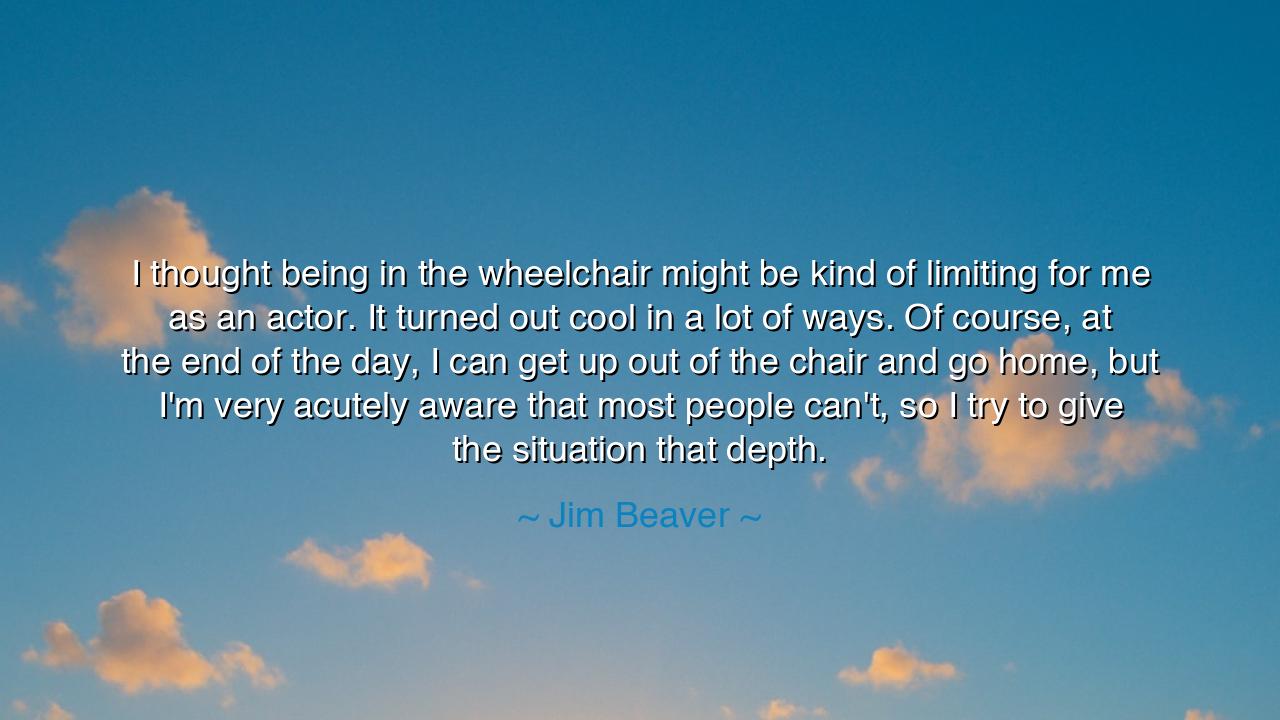
I thought being in the wheelchair might be kind of limiting for
I thought being in the wheelchair might be kind of limiting for me as an actor. It turned out cool in a lot of ways. Of course, at the end of the day, I can get up out of the chair and go home, but I'm very acutely aware that most people can't, so I try to give the situation that depth.






"I thought being in the wheelchair might be kind of limiting for me as an actor. It turned out cool in a lot of ways. Of course, at the end of the day, I can get up out of the chair and go home, but I'm very acutely aware that most people can't, so I try to give the situation that depth." These words, spoken by the actor Jim Beaver, offer a powerful reflection on the human condition, on limitations and perspective, and on how adversity can be a catalyst for deeper understanding. To be faced with a situation that challenges one’s abilities—whether physical, emotional, or mental—often leads us to a place of fear, where we see only the walls of our struggle. But Jim Beaver’s insight teaches us that limitations, rather than being something to dread, can become a source of power, depth, and understanding.
In a world where individualism and achievement are often prized above all else, it is easy to fall into the trap of seeing disability or hardship as an obstacle that must be overcome or avoided. But Jim Beaver’s experience is a reminder that our true strength lies not in escaping our limitations, but in embracing them. His words remind us of the wisdom of the ancient philosophers, who taught that true greatness does not arise from the absence of hardship, but from the manner in which one faces it. Courage is not the absence of fear, but the strength to move forward despite it.
Consider the great general Hannibal, who, when faced with the seemingly insurmountable challenge of crossing the Alps with his army, did not retreat. He did not seek the easy path, but instead saw the mountains as a chance to prove his resolve. By embracing the challenge before him, Hannibal was able to forge a path to victory. Similarly, Jim Beaver, by embracing his wheelchair, did not allow it to define his limitations, but rather turned it into a tool for greater depth and artistry. He recognized that every challenge has the potential to deepen our understanding, if we are willing to face it with courage and perspective.
This principle is echoed throughout history. Consider the story of Helen Keller, who, though born both deaf and blind, became one of the most inspiring figures in the world. Rather than seeing her disabilities as barriers to greatness, she used them to develop an unparalleled sense of determination and compassion. Her limitations were not her burden, but the source of her strength. She, too, understood that depth comes not from the absence of difficulty, but from learning to navigate the world with what we have.
Jim Beaver's reflection on his experience in the wheelchair reminds us that the act of giving depth to a situation is not about pretending that hardships don’t exist, but about acknowledging them with full awareness. It is an understanding that adversity does not diminish our worth, but can, in fact, enrich our experience and deepen our connection to others. When we embrace our struggles, not as something to escape but as something to live through, we are better able to engage with the world around us, with empathy, understanding, and strength.
The depth that Jim Beaver speaks of is not simply a deeper performance on the stage, but a deeper connection to humanity. Actors, like all of us, are tasked with portraying the truth of the human condition. This truth is not always beautiful or uplifting. Often, it is marked by pain, limitation, and imperfection. But it is in these very things that we find our shared humanity. To give depth to a situation, to truly understand the weight of someone’s struggle, we must be willing to step into their shoes—not as observers from a distance, but as participants in the journey.
The lesson here is profound: our limitations do not define us; they shape us. By embracing our struggles, rather than running from them, we can cultivate a deeper understanding of ourselves and others. Just as Jim Beaver found new depth in his acting through the experience of being in a wheelchair, so too can we find growth in our own lives through the challenges we face.
Practical Actions:
-
Embrace Your Challenges: Rather than avoiding difficulties, face them head-on. Understand that every hardship is an opportunity for growth.
-
Seek Depth in Adversity: When faced with limitations, look for the ways in which they can enrich your perspective and deepen your empathy.
-
Cultivate Awareness: Recognize the struggles of others and seek to understand them—not from a distance, but with the awareness that their challenges are also part of the human experience.
-
Be Present in the Moment: Like Jim Beaver, approach every situation with full awareness, bringing depth to both the small and large moments of life.
-
Find Strength in Vulnerability: Do not be afraid to acknowledge your struggles. It is through vulnerability that true strength is revealed.






AAdministratorAdministrator
Welcome, honored guests. Please leave a comment, we will respond soon